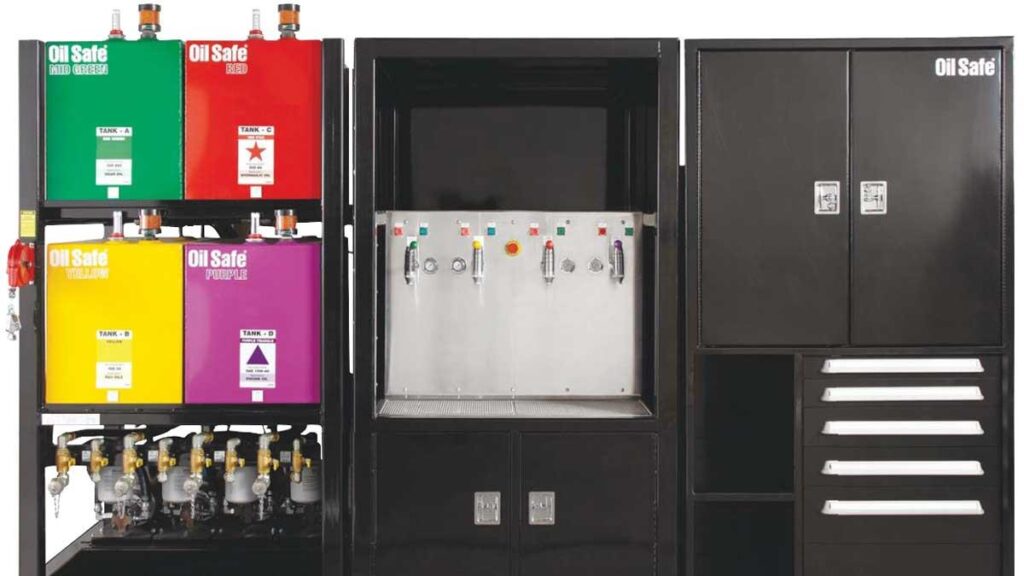
In industries where machinery and vehicles rely heavily on various oils and fluids, managing these essential lubricants in bulk can be complex. A well-designed bulk oil fluid management system is the key to streamlined operations, reduced waste, and significant cost savings. This article explores what bulk oil fluid management systems are, their benefits, key components, and considerations for successful implementation.
What is a Bulk Oil Fluid Management System?
A bulk oil fluid management system is a comprehensive solution that encompasses the storage, dispensing, tracking, and inventory management of oils, lubricants, and other fluids used in industrial or automotive settings. These systems move away from traditional drums and containers, focusing on larger bulk tanks and sophisticated dispensing mechanisms for better control and efficiency.
Benefits of a Bulk Oil Fluid Management System
- Cost Reduction: Bulk purchasing of oils and fluids often comes with discounts. Additionally, minimizing spillage and contamination through a controlled dispensing system further reduces costs.
- Operational Efficiency: Bulk systems reduce downtime associated with refilling smaller containers. Automated tracking and inventory alerts ensure timely replenishment, maintaining operational flow.
- Improved Fluid Quality: Bulk oil storage tanks are designed to minimize contamination, protecting the integrity of fluids. Filtration systems within some management systems further enhance fluid quality.
- Environmental Responsibility: Reduced spillage, contamination prevention, and accurate tracking of waste oils contribute to better environmental practices.
- Enhanced Accountability: Modern systems provide detailed data on oil consumption, helping to identify usage patterns, potential leaks, or inefficient practices.

Key Components of a Bulk Oil Fluid Management System
- Storage Tanks: Available in various sizes and materials (steel, polyethylene) to accommodate different types and volumes of fluids.
- Pumps: Electric or pneumatic pumps facilitate the transfer of fluids from storage tanks to dispensing points.
- Dispensing Equipment: This includes hose reels, nozzles, meters (mechanical or digital) for accurate metering and dispensing control.
- Filtration Systems: In-line filters help remove impurities, ensuring fluids remain clean and suitable for their intended use.
- Inventory Management Software: Sophisticated software solutions track fluid usage, provide real-time inventory levels, generate reports, and automate reordering processes.
Types of Bulk Oil Fluid Management Systems
- Basic Systems: Simple setups with pumps, meters, dispensing equipment and often manual inventory tracking.
- Intermediate Systems: Include advanced metering, filtration options, and basic reporting through integrated software.
- Advanced Systems: Wireless technologies, comprehensive inventory management software with detailed reporting, and potential integration with existing shop management systems.
Considerations for Choosing and Implementing a System
- Types and Volumes of Fluids: A system should cater to the specific fluids used in your facility and the volumes you typically work with.
- Number of Dispense Points: Determine dispensing points for better efficiency and system design.
- Scalability: Choose a system that accommodates potential future growth and expansion.
- Software Integration: Assess compatibility with existing management systems if applicable.
- Vendor Support: Opt for a vendor with good after-sales support, technical expertise, and training.
Additional Considerations and Best Practices
- Place storage tanks in designated, well-protected areas to prevent accidental damage.
- Implement a regular maintenance and cleaning schedule for your bulk oil system.
- Train employees on the proper use, handling, and safety procedures around the system.
- Consider investing in spill containment solutions for environmental safety and compliance.
Conclusion
A well-implemented bulk oil fluid management system brings a multitude of benefits to diverse operations. By streamlining fluid management, enhancing accountability, and enabling better inventory control, these systems offer both operational efficiency and long-term cost savings. Investing in the right system is an investment in the smooth running of your machinery, vehicles, and your business as a whole.
